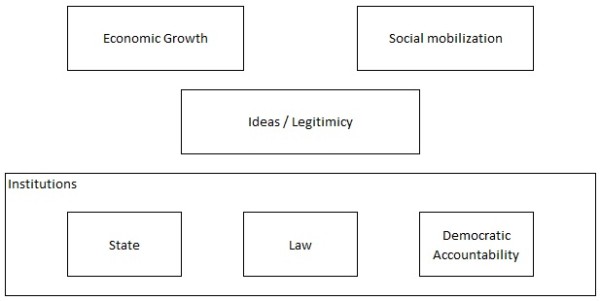Pim Poppe: State, Law and Democracy in a changing world
Pim Poppe: State, Law and Democracy in a changing world

By Pim Poppe, Managing Partner at Probability & Partners
A few weeks before Christmas 2020, I was pondering the question when and how empires or nations collapse and whether countries can also bring themselves down. I thought this would be an interesting question for investors as well.
The question was prompted by the developments of recent years, which I have been observing with increasing amazement. Think of the election of Trump, games with import tariffs and import quotas, the vote for Brexit, and the increasing populism in Central America, Eastern Europe, and frankly also in the old heart of Europe, including the Netherlands. A few weeks later, I was treated to footage of the Storming of the Capitol. The question gained relevance.
‘The Origin of our Politics’
For the sake of fun, I dived into the field of history. This doesn't tell you everything, but it does tell you something. As Mark Twain said: ‘History doesn't repeat itself, but it often rhymes.’
An exciting book with an answer to my question is Francis Fukuyama’s ‘The Origin of Our Politics’: two volumes with over 700 pages each. He describes the rise and fall of nations starting more than 8.000 years before our era. Especially the second volume published in 2014, ‘Political Order and Political Decay: From the Industrial Revolution to the Globalisation of Democracy’, is a nice read.
The end of history?
Remember, this is the same Fukuyama from ‘The End of History and the Last Man’, the best-selling work on the spread of western free-market capitalism, combined with liberal democracy. This work was written in 1992 on the smoldering remains of the Berlin Wall. Plan B – Marxism and everything derived from it – was not a plan. All countries would migrate to the superior free market combined with liberal democracy, resulting in freedom, happiness and equal opportunities for all.
Remarkably enough, however, what many people expected and hoped for, along with Fukuyama in 1992, has not become a reality today. On the contrary, we see many countries that either do not have a democracy or the rule of law at all (for example China, Russia, North Korea) or where these are losing strength (US, Poland, Romania, et cetera).
The rise and fall of civilizations
Fukuyama describes the history of many countries, kingdoms and empires, starting 8.000 years back with Egypt, Mesopotamia, the Ottoman Empire, the Qin-dynasty, the Han-dynasty, Greece and Italy, and many others. One thing is of course clear: there is no standard model for the rise and fall of empires. Each rise and fall has its own dynamics and storylines. Fukuyama neither concludes nor predicts in this work. He just describes. The frame he uses is shown below.

He explains that nowadays some countries have a reasonably functioning democracy, but no competent government or state (India) and other countries have a competent state, but no democracy (China). Others lack legitimacy and eventually get crushed from the inside. For example, the Ancien Régime was brutally terminated in the French Revolution. Fukuyama also describes a country where the forces controlling democracy are so strong, that the state is paralyzed in many domains (the US). In fact, what is needed is a proper balance between the three institutions.
Why is all this relevant to the investor?
In the long run, property rights matter to investors. Education drives innovation and productivity. Social stability provides a good investment climate. An income and wealth distribution perceived as being equitable supports overall stability. A properly functioning state apparatus provides reliable utility functions. A fair trial offers security. Protection against the arbitrariness of the state prevents human capital from fleeing.
It is reassuring that the government has a monopoly on violence and not everyone shoots at each other. All in all, the three institutions also have great value. First for citizens and second for investors. But maybe the state is the starting point. Neither democracy nor markets can flourish properly in the absence of a competent state.
Adaptability of the institutions
Fukuyama often repeats, and I do agree, a core message that institutions, such as the state, democracy, and the rule of law, must adapt to changing circumstances. If they don't adapt in a controlled way, internal (revolution), external (war), or economic surrender will disrupt the status quo.
I think a lot is changing right now and will keep on changing rapidly for the foreseeable future. We are destroying the climate. Superficial social media determines public opinions. Inequality increases. Many dreams become unattainable. Freedoms are limited. And finally, the electorate no longer trusts the state or the democracy. I also think that existing tensions will increase further in the coming years.
Basically, the ideas about the legitimacy of the status quo are changing. What was kind of bearable will become unacceptable. The big question is which countries are able to adapt the state, democracy, and to a lesser extent the rule of law to the needs of our time.
Probability & Partners is a Risk Advisory Firm offering ïntegrated Risk Management and Quantitative Modelling Solutions to the financial sector and data-driven companies.
